The FAAC impasse

As at the time of going to press, the nation was yet to agree on what to share between local governments, states and the Federal Government as part of revenue for the month of May. The meeting of the Federation Account Allocation Committee, FAAC was last week deadlocked again as a result of the controversy over remittance to the Federation Account by the Nigerian National Petroleum Corporation, NNPC, for the month of May. According to reports, the NNPC had remitted N127billion to the Federation Account instead of N147billion. Its remittance was short of N20billion.
That figure has remained problematic. As a result, while briefing journalists on the development, the Minister of Finance, Mrs. Kemi Adeosun, explained that the figures NNPC had proposed for FAAC were “unacceptable.” She also stated that some of the costs the corporation had put forward to defend its under-remittance could not be justified.
In the same vein, the Chairman of Finance Commissioners Forum, Mr. Mahmoud Yunusa, said that the N127billion declared by NNPC as earnings for the month of May was far from the true picture of revenue received. He disclosed that the corporation claimed that it spent N3.5billion on product leakages and pipeline vandalism, which the Department of Petroleum Resources, DPR was not aware of.
As a result of these gaps, the management of NNPC has given its own account of the remittance for the month of May. In a statement by its spokesman, Ndu Ughamadu, the corporation said that the amount it remitted was in line with the terms of agreement it had with the governors of the 36 states of the federation. Ughamadu also said that contrary to what was in the public domain, the corporation surpassed the terms of agreement with the governors by N35 billion. His explanation has even blurred the line the more. Therefore, the disagreement between the FAAC and the NNPC over revenue remittance raises some thorny issues that need urgent resolution by the Federal Government and other stakeholders.
For example, what is the best way to hold NNPC to account for all public revenues accruing to the Federation Account in line with Section 162(1) of the Constitution? As revealed by numerous audits into the financial records and operations of the corporation, the opaque nature of the organisation seems to permit questionable accounting system that makes transparency difficult. The corporation should disclose to Nigerians its remittances to the Federation Account. Indeed, the Act that established the corporation is clear that its account book should be conducted in the spirit of accountability and transparency.
Because these probity issues take time to settle, we hereby urge the Federal Government to resolve the face-off between the NNPC and the FAAC or intervene in a manner to save the tiers of government from further embarrassment as bills are piling up already. States and LGAs depend so much on the monthly allocation from the Federation Account to pay salaries and meet other commitments. NNPC is a statutory government agency vested with duties prescribed by the Constitution and must operate according to the provisions of the law. This they must do by making prompt payouts to the designated accounts with probity in mind.
Therefore, we agree with the National Economic Council, NEC which supported the decision of the FAAC to reject the remittance of NNPC to the Federation Account for the month of May. As we call for the resolution of the matter, we believe that the NNPC has questions to answer over under-remittances to the FAAC.
In this era of anti corruption war, it is expected that things must be done differently. It is therefore auspicious for government to call in auditors to look at the books of NNPC. The disagreements are dragging for too long. The corporation should explain why the states got more revenue from it when crude oil was sold at $50 per barrel, but now receiving far less when oil price in the international market is almost $80 per barrel. Similarly, other government revenue agencies such as the Nigeria Customs Service, NCS and the Federal Inland Revenue Service, FIRS should subject their books for proper accountability and transparency. Governments at all levels need funds to address many challenges, including infrastructural deficits. It should also hold to account those agencies that shortchanged it of revenue. That is one of the ways to ensure transparency and accountability among all revenue-generating agencies.





